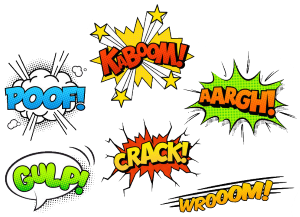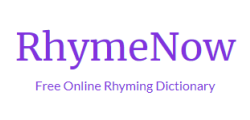
In this lesson, I’ll show you an easy way to write an “onomatopoeia poem,” or what I like to call an “onomatopoem,” even though that isn’t a real word. And I’ll show you why you want to include onomatopoeia in your poems.
An onomatopoeia (pronounced on-uh-mah-tuh-pee-uh) is a word that sounds like the action it describes. For example, the word “boom” sounds like an explosion, and the word “moo” sounds like the noise a cow makes.
Using onomatopoeia in a poem can engage the reader’s senses with more vivid imagery and heightened sensory impact, without having to use additional words. If your poem contains actions, it’s a good idea to include onomatopoeia in your writing. Let me give you an example. Let’s say you were writing a poem about skiing and you said:
Skiing down the snowy hill
This describes what you are doing, and the reader can certainly visualize it. But what if, instead, you said:
Swooshing down the snowy hill
Do you see how this evokes the sense of sound? If gives the reader not just a visual image of the skier, but also the sound that their skis make on the snow, and perhaps even the side-to-side motion of the skis, all without adding extra words.
Poetry Is Condensed Language
Poetry is often described as “condensed language,” meaning that it tries to convey as much meaning and feeling as possible with few words. If you are writing prose—stories, essays, etc.—you still want to be concise; to avoid using unnecessary words. But it’s also okay to be as descriptive as possible.
In poetry, on the other hand, the more meaning or emotion you can pack into just a few words, the better. With onomatopoeia your words can do double duty, conveying both meaning and sensation. Take a look at this excerpt from my poem “What to Do with a Dinosaur” from my book Revenge of the Lunch Ladies.
This morning a dinosaur tromped into school,
ferocious, atrocious, and dripping with drool.
He had to be practically twenty feet tall,
and banged around looking something to maul.He stomped and he snorted, he bellowed and roared.
His head hit the ceiling and busted a board.
That beast was undoubtedly ready for lunch.
He snatched up a chair in his teeth with a crunch,
I’ve underlined the onomatopoeia words in these two stanzas to make them easier to spot. As you can see, these words not only describe what the dinosaur is doing, but they evoke the sounds he is making as well. Without the onomatopoeia, it would lose a lot of its impact, as you can see below.
This morning a dinosaur came into school,
ferocious, atrocious, and covered with drool.
He had to be practically twenty feet tall,
and walked around looking something to maul.
In other words, as you write, and as you edit and revise your poems, look for opportunities to replace your verbs with ones that also evoke sounds.
An Easy Onomatopoeia Poem
If you are writing rhyming poetry, sometimes you may even want to rhyme some of your onomatopoeia words. To make this as easy as possible, I have created a list of rhyming onomatopoeia words, such as bash / crash / smash, and growl / howl / yowl.
You could even write an entire poem with almost nothing but onomatopoeia words if you like. Just look at the list of rhyming onomatopoeia words and string a few together, like this:
Grumble, mumble, rumble, crash.
Flutter, mutter, sputter, splash.
Clatter, shatter, splatter, creak.
Crinkle, tinkle, wrinkle, squeak.
You can write as many lines as you want like this. Then all you need is an ending. Here are a couple of ideas:
These are sounds I heard at home.
My house sounds just like a poem.
Or how about this one?
This is not some great idea.
It’s just onomatopoeia.
Now it’s your turn. If you can add a few more lines of onomatopoeia words to this, and maybe even come up with a different ending, you’ll have created your very own “onomatopoem.”
Learning More about Onomatopoeia in Poetry
If you want to learn even more about onomatopoeia in poems, here are some useful lessons:
- Examples of Onomatopoeia: Famous Poems
- Poetry 101: What Is Onomatopoeia?
- Onomatopoeia Poems for Children
- Enhancing ESL Fluency Through Children’s Poetry - July 24, 2024
- Sensory Poetry Lesson Plan: Bringing Poems to Life Through the Five Senses - July 17, 2024
- The Power of Rhythm: How Poetic Meter Enhances Memory and Recall - July 10, 2024





